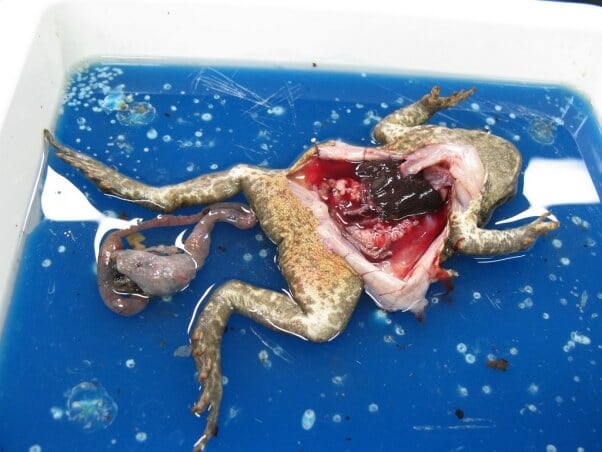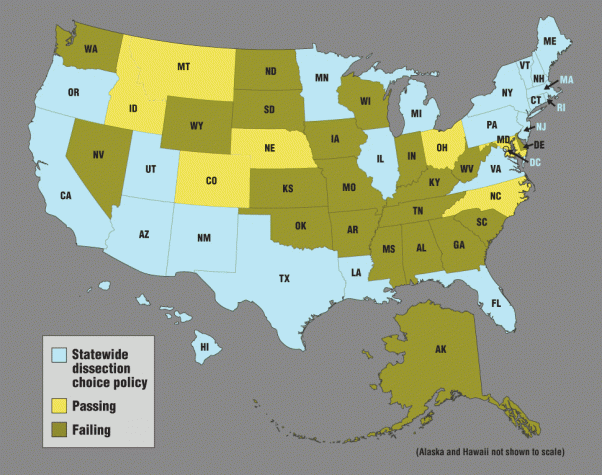PETA’s 2016 National Compassionate Classroom Report Cards

Each year in the U.S., an estimated 10 million frogs, rats, fish, cats, and other animals are used in crude classroom dissection. Biological supply companies obtain these animals by stealing them from the wild, purchasing them from slaughterhouses, breeding them by the millions, and even procuring them from animal shelters. Thankfully, a growing majority of young people—and many teachers—oppose this cruelty.

Today, 22 states and the District of Columbia have created laws and policies that protect students’ right to opt out of cruel animal dissection. For those that have not yet adopted such opt-out policies, PETA has ranked the largest school districts in these states based on the existence and content of their dissection choice guidelines.

The 28 states without state-level dissection choice policies were graded based on the policies—or lack thereof—of their largest school districts.
Studies show that exposing young people to animal dissection can cause lifelong psychological distress, dissuade some students from pursuing careers in science, and even foster callousness toward animals. More and more educators recognize that they can play an important role in preventing animal suffering and creating compassionate classrooms for students by adopting modern, educationally effective, economical non-animal methods like computer-based virtual dissection that are endorsed by experts and educational organizations.
PETA praises the school districts that already allow compassionate students to choose modern and humane teaching tools—and encourages the states and districts without such policies to implement formal and comprehensive options for their students to choose alternatives to dissection.
School districts were placed on the “Dean’s List” with an “A+” if they do not conduct any animal dissection. Way to go!
OHIO
- Cleveland Metropolitan School District (Cleveland)
WASHINGTON
- Tacoma Public Schools (Tacoma)

Districts that received an “A” have formal dissection-specific policies that require teachers to offer humane non-animal methods to students who request them.
ALABAMA
- Baldwin County Public Schools (Bay Minette)
COLORADO
- Jeffco Public Schools (Golden)
- Denver Public Schools (Denver)
DELAWARE
- Red Clay Consolidated School District (Wilmington)
GEORGIA
- Fulton County Schools (East Point)
INDIANA
- Evansville Vanderburgh School Corporation
IOWA
- Sioux City Community Schools (Sioux City)
KANSAS
- Shawnee Mission School District (Shawnee Mission)
KENTUCKY
- Jefferson County Public Schools (Louisville)
MARYLAND
- Anne Arundel County Public Schools (Annapolis)
- Baltimore City Public Schools (Baltimore)
- Baltimore County Public Schools (Towson)
- Montgomery County Public Schools (Rockville)
- Prince George’s County Public Schools (Upper Marlboro)
MISSOURI
- Rockwood School District (Eureka)
NEVADA
- Clark County School District (Las Vegas)
- Lyon County School District (Yerington)
- Washoe County School District (Reno)
NORTH CAROLINA
- Charlotte-Mecklenburg Schools (Charlotte)
- Winston-Salem/Forsyth County Schools (Winston-Salem)
OHIO
- Toledo Public Schools (Toledo)
WASHINGTON
- Kent School District (Kent)
WISCONSIN
- Racine Unified School District (Racine)

Districts that received a “B” have general policies that allow students to opt out of objectionable classroom material—which would include animal dissection—and be provided with an alternative assignment.
COLORADO
- Douglas County School District (Castle Rock)
GEORGIA
- Gwinnett County Public Schools (Suwanee)
IDAHO
- Boise School District (Boise)
- Coeur d’Alene Public Schools (Coeur d’Alene)
- West Ada School District (Meridian)
KENTUCKY
- Boone County Schools (Florence)
NEBRASKA
- Lincoln Public Schools (Lincoln)
- Millard Public Schools (Omaha)
- Omaha Public Schools (Omaha)
- Papillion La Vista Community Schools (Papillion)
NORTH CAROLINA
- Cumberland County Schools (Fayetteville)
OHIO
- Akron Public Schools (Akron)
- Cincinnati Public Schools (Cincinnati)
- Columbus City Schools (Columbus)
OKLAHOMA
- Edmond Public Schools (Edmond)
SOUTH CAROLINA
- Greenville County School District (Greenville)
TENNESSEE
- Rutherford County Schools (Murfreesboro)
WEST VIRGINIA
- Cabell County Schools (Huntington)
WISCONSIN
- Green Bay Area Public Schools (Green Bay)

Districts that received a “C” have general policies allowing students to opt out of certain classroom material—which would include animal dissection—but do not require teachers to provide a non-animal assignment.
ALASKA
- Fairbanks North Star Borough School District (Fairbanks)
COLORADO
- Cherry Creek School District (Greenwood Village)
IOWA
- Cedar Rapids Community School District (Cedar Rapids)
KANSAS
- Olathe Unified School District 233 (Olathe)
KENTUCKY
- Fayette County Public Schools (Lexington)
MISSISSIPPI
- Jackson Public Schools (Jackson)
MONTANA
- Billings Public Schools (Billings)
WISCONSIN
- Milwaukee Public Schools (Milwaukee)
WYOMING
- Laramie County School District (Cheyenne)

Districts that received a “D” have an informal practice of allowing students to choose humane science activities but no written or formal policy regarding animal dissection.
ALABAMA
- Mobile County Public Schools (Mobile)
ALASKA
- Anchorage School District (Anchorage)
ARKANSAS
- Little Rock School District (Little Rock)
- Rogers Public Schools (Rogers)
COLORADO
- Adams 12 Five Star Schools (Thornton)
INDIANA
- Fort Wayne Community Schools (Fort Wayne)
- South Bend Community School Corporation (South Bend)
IOWA
- Des Moines Public Schools (Des Moines)
GEORGIA
- Cobb County School District (Marietta)
KANSAS
- Blue Valley Schools (Overland Park)
KENTUCKY
- Kenton County School District (Fort Wright)
MISSOURI
- Francis Howell School District (St. Charles)
- Springfield Public Schools (Springfield)
NORTH CAROLINA
- Guilford County Schools (Greensboro)
- Wake County Public School System (Cary)
NORTH DAKOTA
- Bismarck Public Schools (Bismarck)
- West Fargo Public Schools (West Fargo)
OKLAHOMA
- Oklahoma City Public Schools (Oklahoma City)
SOUTH CAROLINA
- Berkeley County School District (Moncks Corner)
- Richland School District Two (Columbia)
TENNESSEE
- Knox County Schools (Knoxville)
WASHINGTON
- Seattle Public Schools (Seattle)
- Spokane Public Schools (Spokane)
WEST VIRGINIA
- Kanawha County Schools (Charleston)
WISCONSIN
- Madison Metropolitan School District (Madison)

School districts were given an “F” grade if they have no policy allowing students to opt out of classroom animal dissection.
ALABAMA
- Jefferson County Schools (Birmingham)
- Montgomery Public Schools (Montgomery)
- Shelby County Schools (Columbiana)
ALASKA
- Matanuska-Susitna Borough School District (Palmer)
ARKANSAS
- Fort Smith Public Schools (Fort Smith)
- Pulaski County Special School District (Little Rock)
- Springdale Public Schools (Springdale)
DELAWARE
- Appoquinimink School District (Odessa)
- Brandywine School District (Wilmington)
- Christina School District (Newark)
- Colonial School District (New Castle)
GEORGIA
- Clayton County Public Schools (Jonesboro)
- DeKalb County School District (Stone Mountain)
IDAHO
- Nampa School District 131 (Nampa)
- Pocatello/Chubbuck School District 25 (Pocatello)
INDIANA
- Hamilton Southeastern Schools (Fishers)
- Indianapolis Public Schools (Indianapolis)
IOWA
- Davenport Community Schools (Davenport)
- Iowa City Community School District (Iowa City)
KANSAS
- Kansas City, Kansas Public Schools (Kansas City)
- Wichita Public Schools (Wichita)
KENTUCKY
- Hardin County Schools (Elizabethtown)
MISSISSIPPI
- DeSoto County Schools (Hernando)
- Harrison County School District (Gulfport)
- Madison County Schools (Ridgeland)
- Rankin County School District (Brandon)
MISSOURI
- North Kansas City School District (Kansas City)
- St. Louis Public Schools (St. Louis)
NEBRASKA
- Bellevue Public Schools (Bellevue)
NEVADA
- Elko County School District (Elko)
NORTH DAKOTA
- Fargo Public Schools (Fargo)
- Grand Forks Public Schools (Grand Forks)
- Minot Public Schools (Minot)
OKLAHOMA
- Moore Public Schools (Moore)
- Putnam City Schools (Oklahoma City)
- Tulsa Public Schools (Tulsa)
SOUTH CAROLINA
- Charleston County School District (Charleston)
- Horry County Schools (Conway)
SOUTH DAKOTA
- Rapid City Area Schools (Rapid City)
- Sioux Falls School District (Sioux Falls)
TENNESSEE
- Hamilton County School District (Chattanooga)
- Metropolitan Nashville Public Schools (Nashville)
- Shelby County Schools (Memphis)
WASHINGTON
- Evergreen Public Schools (Vancouver)
WEST VIRGINIA
- Berkeley County Schools (Martinsburg)
- Raleigh County School District (Beckley)
- Wood County Schools (Parkersburg)
WISCONSIN
- Kenosha Unified School District (Kenosha)
WYOMING
- Natrona County Schools (Casper)
Studies show that non-animal teaching methods—such as interactive computer programs—translate into superior student learning. The National Science Teachers Association (NSTA) and the National Association of Biology Teachers advise teachers to offer non-animal assignments to students who request them. The NSTA also approves the use of non-animal methods as complete replacements for animal dissection in the classroom.

To facilitate humane science education, PETA has a program that provides teachers with free virtual-dissection software. And TeachKind, PETA’s resource department for educators, can help teachers and other school staff foster compassion for animals in their students by enacting humane, life-affirming classroom policies.
PETA’s youth division, peta2, assists compassionate students who want to opt out of animal dissection in working with teachers and school administrators to request humane assignments, and peta2 can provide free leaflets and stickers to encourage friends and classmates to opt out, too.







